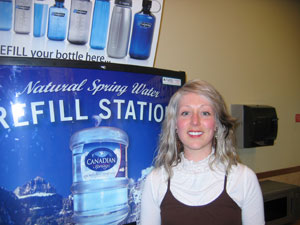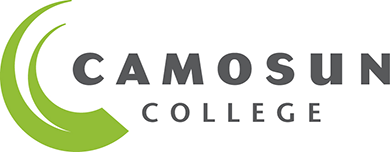Water bottle chemical wins for Camosun student
Archived Content
This archived web page remains online for reference, research or record-keeping purposes. This page will not be altered or updated and may contain out of date information. If you’re looking for specific information and haven’t found it, please contact communications@camosun.ca.
 |
| Shanna McDonald stands in Camosun’s Fisher building beside a poster (top of photo) advertising refillable bottles made by "Nalgene" (recently pulled from the Mountain Equipment Co-op shelves because they contain Bisphenol-A). |
She hardly had time to prepare. Camosun College student Shanna McDonald was listening to a guest lecturer in her second year Applied Chemistry and Biotechnology (ACBT) program, when he announced that the Chemical Institute of Canada was accepting presentations for a student symposium at the University of Victoria. The deadline was at 5pm that same day. Having recently completed a paper on the "Emerging Dangers of Bisphenol-A", McDonald asked if this topic would suit.
With only a weekend to arrange her 15-minute oral presentation for the January 29 event, she impressed the judges, placing second among seven participants. This was the first time in over 20 years that a Camosun student participated in the symposium.
Why Bisphenol-A?
Walking by a Mountain Equipment Co-op store, McDonald was drawn to the controversy surrounding MEC’s December decision to stop selling food and beverage containers made of polycarbonate plastic. Investigating further, she wrote a course paper: Polycarbonates contain Bisphenol-A, which mimics the female hormone estrogen and is derived from petrochemicals. Linked to hormone disruption in numerous studies, Bisphenol-A was originally created as a potential estrogen replacement. However, when a better estrogen replacement compound was discovered, it was found Bisphenol-A could also be used to create the tough, high-performance polycarbonate plastic material.
"It is like getting a key cut of plastic instead of metal for an estrogen lock—it produces the same physiological response as estrogen," says McDonald. Our bodies think Bisphenol-A is a natural hormone and use it to regulate our endocrine system. In animal studies, it has been linked to the "feminization of wildlife" and in humans linked to decreased sperm quality, early puberty and even weight gain. Polycarbonate can be identified by checking the container for the recycle code 7.
The use of polycarbonate extends well beyond plastic drinking bottles. Baby bottles, dental sealant and the lining of tin cans are made of polycarbonate. Health Canada is conducting an assessment of Bisphenol-A with a final report due in 2009. If the findings are negative, it is hard to conceive of all the potential affects to industry.
Why the Applied Chemistry and Biotechnology program?
"Something about Camosun allows more room to be creative in a scientific setting," says McDonald.
A veteran of the university setting, McDonald had heard great things about the Camosun ACBT program and wanted to experience a different learning atmosphere. Originally from Newfoundland, she had taken courses at Memorial University and the University of Toronto, but after starting her Biochemistry degree at UVic, she decided to transfer into the second year of the ACBT program. She was immediately pleased with her choice, noting that participants take the program because they want to be here. McDonald says the mature attitude of students is further augmented by the individual support offered by instructors.
In contrast to her previous experience, McDonald says ACBT students have a closer relationship with instructors, and there is a concern about a student’s well-being and their absorption of course material, rather than just test-based competition.
The ACBT program is designed for students who wish to enter the job market after college or go on to university, either directly or after working in their field for some time. It is ideal for students wanting to enter careers in analytical chemistry related to the health of the environment, synthetic organic chemistry and pharmaceuticals, other fields of chemistry or careers in microbiology, immunology, biochemistry and biotechnology related to human and animal health. The program also prepares students interested in furthering their education at university in any of these fields or in medicine, veterinary medicine or pharmacy. Graduates of the ACBT program have block transfer to the Environmental Sciences Program at Royal Roads University. The combination of university-transfer courses (registration guaranteed) and the development of excellent laboratory skills is optimal for students wishing to undertake work-experience within the program and co-op education at university. Special seminar courses provide the students with tours, field trips and education that will prepare them for success in interviewing for a job or a co-op position.
After completing the program, Shanna plans to finish her Biochemistry degree at UVic and has a number of exciting post-graduate options in mind.
Is the Applied Chemistry and Biotechnology program for you?
For further information contact Dr. Larry Lee at 370-3463 or leel@camosun.bc.ca and visit the Applied Chemistry and Biotechnology.
Last updated: October 16, 2009 11:11 am


